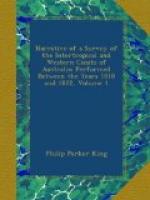May 27.
But, at daylight, on looking at the place where they had been concealed during the last evening, a canoe, which had been observed hauled up among the bushes, was missing, and we concluded that they were close to us; this proved to be the case, for no sooner had we cleared the point, than the natives sallied forth from the thicket, and, running up to their middles in the water to within thirty yards of the vessel, set up a loud shout which startled us not a little; for, busied as we were in securing the anchor and making sail, our attention at the moment was otherwise directed; and the first intimation that we had of their vicinity was from the noise they made, which was accompanied by violent gestures and pressing invitations for our return; but we continued on our way, and disregarded all their solicitations. They were evidently very much disappointed, since they expected to get some axes from us, for they made the same signs as the Luxmore Head natives had done by repeatedly imitating the action of chopping. On the south shore there were some women and children under the protection of two natives, whose voices were also loudly raised for our recall. The natives on our side were unarmed, but two bundles of spears were detected, propped up against a tree, close at hand. After some time they waded back to the shore, and slowly walked towards our wooding-place, where they, of course, found a chisel that had purposely been left for them upon the stump of a tree which had been felled by our wooding-party.
As soon as we crossed the bar we anchored, in order to obtain some lunar distances to fix the longitude of the port, as well as to bring up and complete the chart of this part of the coast. During the day, the natives remained at our wooding-place, and set the bushes on fire, the smoke of which enveloped the horizon and the neighbouring coast.
The names of Port Hurd and Mount Hurd were given to the harbour and the round-backed hill, after the late Captain Thomas Hurd of the Royal Navy, the Hydrographer of the Admiralty; the outer bay was called Gordon Bay.
May 28.
We left Gordon Bay the next morning, and passed round its low South-West extremity, which proved to be Captain Baudin’s Cape Helvetius. From this point the coast trends to the southward to Cape Fourcroy. In this interval the shore is formed by cliffs of a very dark red colour, and, half way between, is a projecting sandhill of remarkable appearance.
May 29 and 30.
During this and the following day we made very little progress. On the 30th at daylight we had a southerly wind; by eight o’clock we saw the land in patches to the northward, and some low islands bearing east. The land to the north was a part of the south side of Melville Island. The wind being fresh from the eastward we attempted to beat to windward, with the intention of anchoring near the islands, but the bottom was too rocky to admit of it. We then




